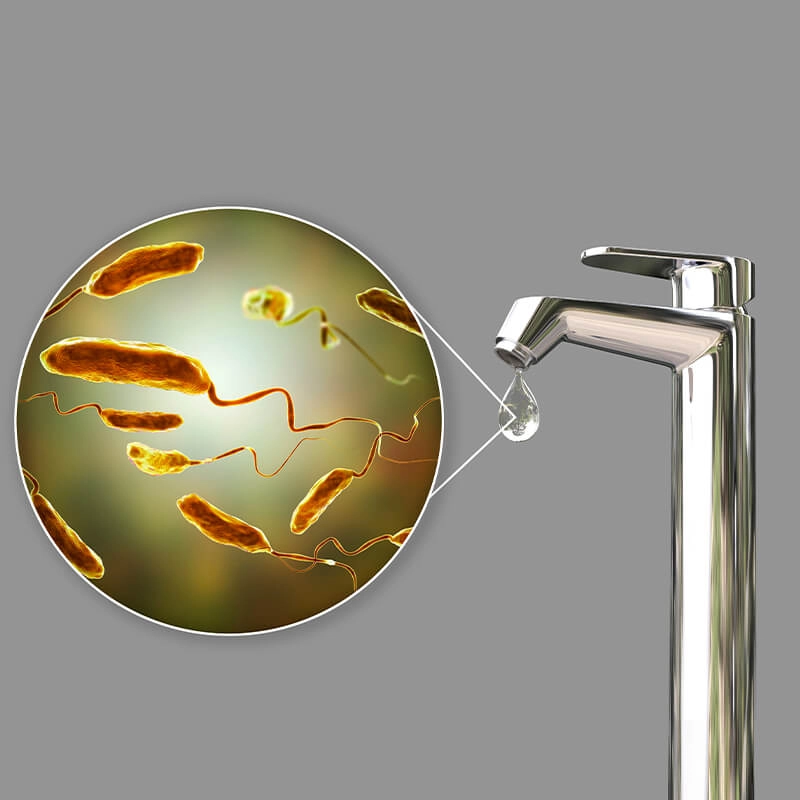Home/Wellness Zone/Sakra Blogs
3rd Apr, 2020

Overview
Recently fifteen cases of cholera have been reported in India in Bengaluru city. There is already a panic across the world over the global outbreak of the novel coronavirus and now water-borne diseases have been reported in Bangalore.
Cholera cases have been reported from the South, East, and West divisions of Bangalore and water supply to these areas have been stopped until the source of infection is found.
What is Cholera?
Cholera is a bacterial disease which spreads through contaminated water and food. It is an extremely severe disease that can cause acute watery diarrhoea with severe dehydration.
What Causes Cholera?
It is caused by the bacterium Vibrio cholera. It produces a toxin in the small intestine that causes the body to secrete enormous amounts of water, leading to diarrhoea and a rapid loss of fluids.
The bacteria can be found in surface or well water, seafood, raw fruits and vegetables, municipal water supplies, ice made from municipal water grains, etc.
What are the Symptoms of Cholera?
Most people infected with Vibrio cholera do not show any symptoms, although the bacteria are present in their faeces for 1-10 days after infection, they can still infect others through contaminated water.
It takes 12 hours to 5 days for a person to develop symptoms after consuming contaminated food or water. Cholera affects both children and adults and can cause death within hours if not treated.
Symptoms of cholera infection include:
Diarrhoea
Nausea and vomiting
Dehydration
Low blood pressure
Muscle cramps
What are the risks associated with cholera?
Everyone is vulnerable to cholera except the infants who get immunity from nursing mothers who have previously had cholera. Still, there are certain risk factors that can cause cholera such as:
Poor sanitary conditions
Reduced stomach acid
Household exposure
Type O blood
Raw or undercooked seafood
How is cholera diagnosed?
A stool sample test is the only way to confirm a diagnosis of cholera. In areas with no laboratory testing, the Crystal ® VC dipstick rapid test is done to confirm the cholera diagnosis. This test helps to decrease the death rates at the start of the cholera outbreaks.
How is cholera treated?
Immediate treatment is necessary for cholera as it can cause death within hours. There is a vaccine for cholera but WHO have specific guidelines for who should be given the vaccine.
Other methods of treatment are:
Rehydration: Oral rehydration salts (ORS) is used to replace the lost fluids and electrolytes. It is available in powdered form and can be made with boiled or bottled water.
Intravenous fluids: People who are severely dehydrated require intravenous fluids to get better.
Antibiotics: Severely dehydrated patients need antibiotics to reduce the duration of diarrhoea and shorten the amount and duration of V. cholerae excretion in their stool.
Zinc supplements: Zinc reduces the duration of diarrhoea and shortens the duration of cholera in children.
How can you Prevent Cholera?
There are a few things you can do to protect yourself and your family from cholera.
Use boiled water, chemically disinfected water or bottled water only for the following purposes:
Drinking
Preparing food
Making your teeth
Washing your face and hands
Washing fruits and vegetables
Washing dishes and utensils
Brushing your teeth
To prevent cholera consume food from hygienic outlets only. Eat well-cooked food and use water only from a clean source. You can disinfect the water by boiling it for 1 minute to 3 minutes at a higher temperature.
Things you should avoid:
Raw food
Unpeeled fruits and vegetables
Raw or undercooked meat or shellfish
Fruits kept exposed for a prolonged period under unhygienic conditions
Be aware of the sources of the food and the consequences of consuming solid food and drink prepared under poor hygienic conditions.
Note: If you develop severe diarrhoea and vomiting then seek medical help immediately. Cholera is highly treatable if treated within a few hours of developing symptoms.
Enquire Now
